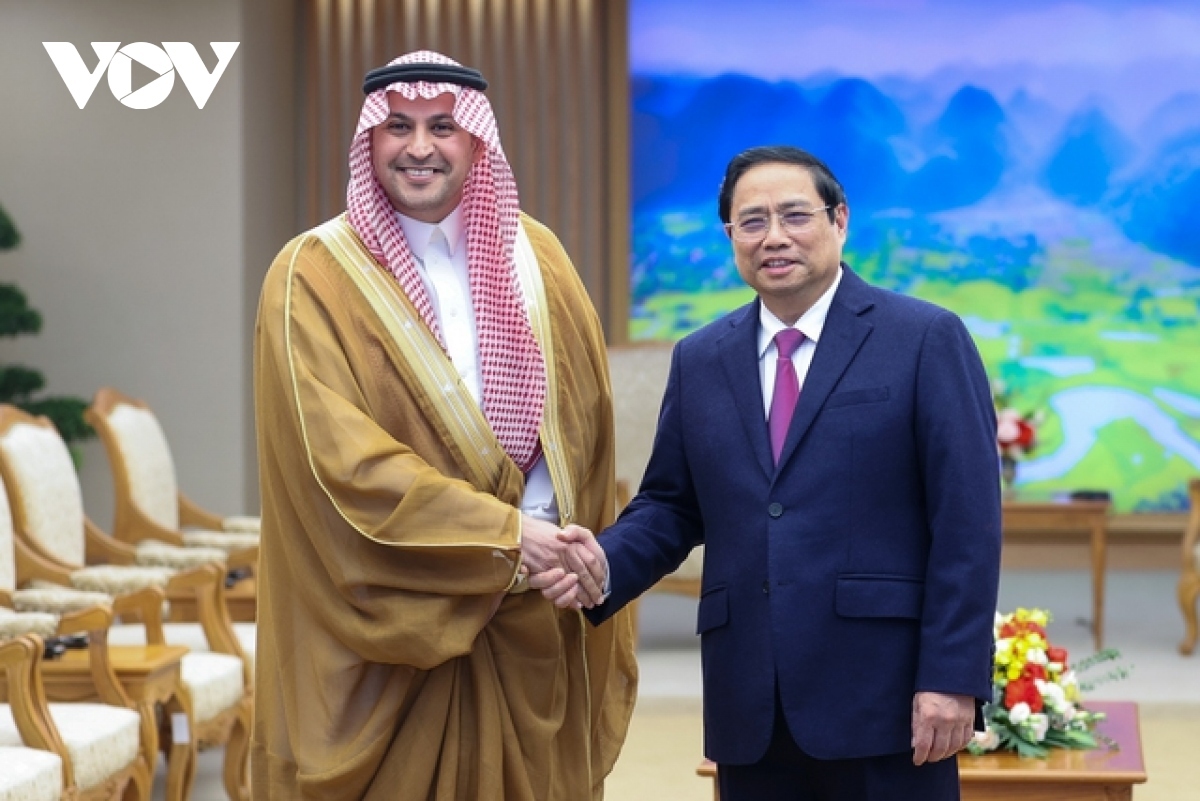Vietnam seeks to build stronger economic links with Saudi Arabia
VOV.VN - Prime Minister Pham Minh Chinh has suggested that the nation and Saudi Arabia further step up co-operation in the digital economy, green economy, circular economy, tourism, labour, and employment.

Prime Minister Pham Minh Chinh hosted a reception on March 29 in Hanoi for Saudi Arabian Ambassador to Vietnam Mohammed Ismaeil A. Dahlwy who paid a courtesy visit.
At the meeting, on the occasion of the Muslim festival of Ramadan, PM Chinh wished the Ambassador, his Saudi Arabian friends in Vietnam, King Mohamed Bin Abdulaziz Bin Salman, and Crown Prince and Prime Minister Mohamed Bin Salman peace and happiness.
The Vietnamese cabinet leader hailed the Saudi diplomat’s efforts to strengthen the friendship and co-operative relations between the two countries over recent times, while believing that with his experience and dynamism, the Ambassador will continue to make greater contributions to advancing the two countries' relations for further development.
The Vietnamese Government will direct relevant Vietnamese agencies to co-ordinate and support the Ambassador in fulfilling his duties, he added.
In pursuit of a foreign policy of independence, self-reliance, diversification, multilateralisation, and friendship, as well as both being reliable partner and a responsible member of the international community, Vietnam is interested in and wishes to strengthen ties with Middle Eastern countries, including Saudi Arabia, which is a major state actor in the region.
PM Chinh applauded the achievements that the Saudi people have recorded in national construction and development under the leadership of King Salman and Crown Prince and PM Mohamed Bin Salman, which has contributed to realising the "Vision 2030" goal and affirming the important role and position of Saudi Arabia both in the region and in the world as a whole.
Ambassador Dahlwy said he had witnessed Vietnam's tremendous achievements in the context of complicated and difficult developments globally.
Furthermore, the relationship between the two countries has been increasingly consolidated and strengthened on the basis of mutual respect and providing mutual support in regional and international issues, he said, expressing his confidence that the linkages between the two countries will be further enhanced moving forward.
PM Chinh and Ambassador Dahlwy highly appreciate the positive developments made in bilateral co-operation.
Saudi Arabia is currently one of the country’s leading economic partners in the Middle East, with two-way trade turnover in 2022 reaching US$2.7 billion, up 32.4% on-year.
PM Chinh also highlighted the huge potential that exists for further co-operation between the two countries, especially in economics, trade, and investment.
The Vietnamese Government leader said that the nation is building an independent and self-reliant economy associated with proactive extensive, substantive, and effective international integration.
He therefore suggested that two sides co-ordinate more closely to boost the multifaceted ties between the two sides in an effective manner.
Accordingly, both countries should continue to consolidate political trust, boost co-ordination in launching a broad array of exchange activities of delegations at all levels, especially high-level ones, thereby further promoting the role of bilateral co-operation mechanisms. This is along with swiftly arranging the fifth meeting of the Vietnam - Saudi Arabia Intergovernmental Committee in 2023.
He also suggested that Saudi Arabia, with its role and influence, support the Vietnamese side in soon finalising procedures for signing a Memorandum of Understanding (MoU) with the Secretariat of the Gulf Cooperation Council (GCC).
PM Chinh asked the two sides to create favourable conditions for exports to each other's markets, outlining a wish for Saudi Arabia to facilitate the import of strong Vietnamese commodities that Saudi Arabia is in demand of, such as rice, tea, pepper, coffee, rubber, garments, and textiles.
He proposed the Middle East nation completely lift the ban on importing seafood from Vietnam imposed back in January, 2018, as well as helping Vietnam develop the Halal industry and access the markets of Saudi Arabia and Muslim countries.
PM Chinh affirmed that the Vietnamese side is ready to offer favourable conditions for the operation of investment funds and Saudi Arabian groups in Vietnam.
He suggested that the two sides move to sign an agreement on investment promotion and protection in order to create a legal framework and favourable investment environment for investment co-operation between the two countries.
Ambassador Dahlwy agreed with the proposals put forth by PM Chinh, adding that the Saudi side is making efforts to co-ordinate with Vietnamese agencies to implement specific areas of co-operation.
This includes promoting the exchange of high-level delegations between the two countries, accelerating the implementation of signed agreements and conducting negotiations to sign more co-operation agreements between the two nations, including co-operation in developing the Halal food industry.
At the request of Ambassador Dahlwy about the visa policy for Saudi citizens, PM Chinh said that the Vietnamese Government is studying and adjusting regulations. The Vietnamese National Assembly will consider this issue in the near future toward facilitating foreigners' entry and exit into the country.
Regarding co-operation at multilateral and regional forums, PM Chinh and the Saudi Arabian Ambassador applauded the co-ordination and mutual support between the two countries.
Vietnam is willing to support Saudi Arabia to bolster ties with ASEAN as well as links between ASEAN and the Gulf Cooperation Council, in line with potential and strengths of each side and on the principle of mutually-beneficial co-operation, he told his guest.
He said he hopes that Saudi Arabia will continue to support the stances of ASEAN and Vietnam in peacefully resolving disputes in the East Sea, ensuring freedom of aviation and navigation in the East Sea, for peace, stability, co-operation and development in the region and the world.

